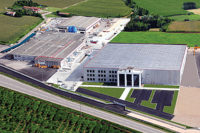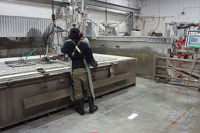Over the years, Vitória Stone developed agreements for access to some of the most exclusive quarry sites in Brazil. It now operates 20 quarries, and it employs 130 people in all.
The company maintains a vast inventory of raw materials as well as polished slabs — with a constant supply of basic materials as well as exotics. The process at Vitória Stone’s factory begins with blocks, which are cut into raw slabs on one of six gangsaws from Gaspari Menotti of Italy. Vitória Stone has also invested in a state-of-the-art multi-wire saw from Bideseimpianti, which cuts blocks into slabs at an optimal rate of speed and efficiency.
The raw slabs are then calibrated on an automated unit from Gaspari Menotti, and from there they are treated with resin. For more complicated materials, where some portions of the slab may need more resin treatment than others, the resin products are applied by hand and then cured in drying units from Rosh Industrial. Meanwhile, materials that are more uniform are processed on a large-scale automated resin-treatment line.
After the resin is applied, the slabs are polished on one of two automated lines from Breton of Italy. To meet the demands of the international marketplace, the factory has implemented strict quality control and processing standards.
In all, Vitória Stone expects to process 450,000 square meters of material in 2012, a 20% increase over last year’s total. Of that total, 70% is exported, with half going to North America and the remainder going to markets in Europe and Asia.
Although sales will improve this year, the company is cautiously optimistic about the future. “Business [in 2012] will be better than last year, but we are not there yet,” said Daniel Lopez of Vitória Stone. “This is the end of a cycle, and the next two or three years will be better. It will not be like five or six years ago, but it will be better.”
Lopez also commented that the stone industry in general is becoming more skilled, which is why Vitória Stone’s emphasis on quality will serve it well into the future. “This is a young industry,” he said. “And as companies are entering their second or third generation, they are becoming more professional.”















